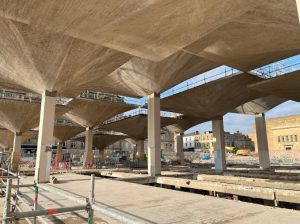Regional Growth: Does Manchester have too many advantages over Leeds?

How is Yorkshire doing economically? It clearly has so much going for it and is strong in a number of key sectors.
Sixteen successful business people, across a range of key sectors, came together at the EY offices in Leeds to work out just how Yorkshire’s economy can be improved as part of a series of discussions on ‘Regional Growth’.
This is the second of a two-part of the report on those discussions, focusing on a popular area for debate – how does Leeds compare to the other large regional centres (Manchester and Birmingham)?
To read the main report click here
Stephen Church, EY’s UK&I North Markets Leader & Manchester Office Managing Partner, highlighted Manchester’s knack of putting itself in the limelight.

Stephen Church
“Yorkshire seems to have to shout louder to fight for its voice to be heard. Let me compare it to the North West, and in particular, to go to Manchester, which seems to have had a more mature approach to how it markets itself and positions itself from an attractiveness perspective. And I think if I look over the last two years and also look ahead, Merseyside is coming up fast with Steve Rotheram.
“So what is Yorkshire going to do to create its position in the market, to maintain a level of attractiveness. So that’d be my point around the fight for the noise and what is Yorkshire’s USP? Because not everybody can be everything. And actually every region is trying to do absolutely everything and copycat each other.
“Last week we had the energy announcement, which was almost equal in opportunity for the North West and the North East yet it was all announced in the North West. The opportunity around the decarbonisation of supply chains, the decarbonisation of transport systems and other systems… it’s just as rich over this side of the country as it is on the west but why does the West get the noise?”
Andrew McPhillips, Chief Economist at the Northern Powerhouse Partnership, also highlighted the edge Manchester has from a cultural perspective.
He said: “In terms of culture, I think sometimes we forget how important that is.
“It isn’t a tipping point for foreign investors but I was recently at an event with US investors and the offer that Manchester had in terms of having two very successful Premier League football teams, having a culture of the music and everything else that went along with it – it wasn’t the reason that they invested there – but if there was a choice of two places, it was sometimes just the tipping point.
“Because when they were bringing over a key decision maker over from the US, Manchester could lay on the hospitality, they could lay on the other things and they could just feel something about the place and it had a sense of identity. And if I was going to be slightly critical, I’m not sure that we have that strength here.”
Médéric Payne, Chief Executive Officer of carpet tile maker AIREA, wholeheartedly agreed.
“So my customers all want to come to Leeds? No it’s Manchester. ‘I know Manchester’. ‘I want to see City or United’. ‘I want to be around there and stay in Manchester’. I can’t get them anywhere near Leeds and, when you talk about it internationally, Leeds is not known.”
James Wheelwright, chief Executive of J&C Joel, was full of admiration for the job Manchester has done, especially in terms of making itself a 24/7 vibrant place to visit.
“I think Manchester is fantastic,” he said. “A lot of the areas which were very run down have been redeveloped and I think Andy Burnham realised that, as a city, the shopping’s dying. So you look around now at the huge amount of apartments, restaurants, entertainment, venues and stuff like that.
“Manchester’s also got two huge arenas now. It’s got a load of entertainment. You go out on a Tuesday or Wednesday night in Manchester and it’s busy. Come out in Leeds on the Tuesday or Wednesday and it’s dead. He’s made a city busy.”
Birmingham-born Dan Spencer of property developers Torsion also was full of praise for how Manchester has gone about reinventing itself.
“They (leaders in Manchester) had a vision. They used their pension funds well to help developers in areas that were struggling. They actually pooled their resources to have a vision of where they want property, a vision of what they want areas of that city to be like and they’ve seen the vision through.
“I also think Birmingham has seen the same. They have done their Metro expansion well, opening up parts of the city no-one wanted to live in. For example they’ve managed to pull students to the Fiveways area, which previously was a rundown area. No one wanted to be there.
“But it was said earlier. It’s about vision and leadership. And I think people like Andy Street in Birmingham, over the last six years, has had a great vision and he’s seen it through. He took the advice of people and then managed to pass things in to right people in government. And you can’t do it on your own. One man can’t do it, or one lady can’t do it. But if you can as a Mayor, facilitate the right conversations, I think you start to win.
“I’ve seen it happen in Birmingham first hand, where we developed student schemes where I would never have put them. But they’ve been a roaring success and a lot of that comes back to the transport. Suddenly you’re opening up areas that are now accessible and weren’t previously.”
Payne also highlighted the difference between the two city’s airports.
“Leeds for me, is missing a trick. What Manchester has and Leeds hasn’t got is a proper airport.
“Until that’s tackled, I am struggling with businesses. Manchester Airport is not perfect but at least they have an international airport. I can get to places whereas Leeds is just bitty. It’s not serious and for me, that is part of why Leeds is not where it needs to be.”









